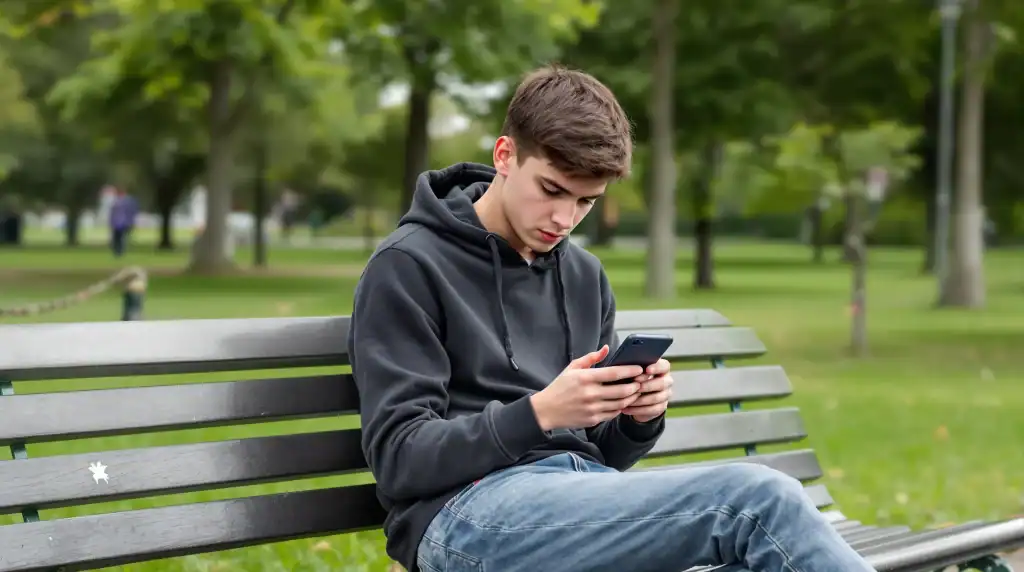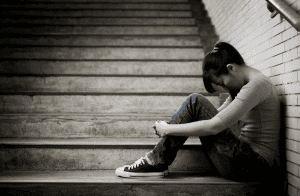Picture this: your typically talkative teenage son suddenly becomes withdrawn, snapping at simple questions and spending hours locked in his room. What you might dismiss as typical teenage attitude could actually be anxiety disguised behind a mask of irritability and isolation. As many as 1 in 5 children and adolescents in the United States have a mental, behavioral, or emotional disorder, yet anxiety in teen boys often goes unrecognized because it doesn’t look like what we’d expect.
Unlike their female peers who might openly express worry or fear, teenage boys frequently channel their anxiety through completely different behaviors. They’ll take dangerous risks, lash out unexpectedly, or completely shut down emotionally rather than admit they’re struggling. Boys may view showing emotion as a sign of weakness, making them far less likely to communicate their internal battles with the mounting pressures of school, sports, and social expectations.
Understanding these hidden signs isn’t just helpful—it’s essential for your son’s mental health and development during this critical period.
Understanding Anxiety in Teen Boys
Anxiety in teen boys affects approximately 12.3 percent of adolescent males in the United States according to the National Survey of Children’s Health. These rates have increased significantly in recent years, partly due to stressors from the COVID-19 pandemic. Understanding how anxiety manifests in teenage boys requires recognizing that their symptoms often differ dramatically from what parents expect.
Teenage boys experience anxiety through complex behavioral patterns that mask their internal struggles. They may view emotional expression as weakness, which makes them less likely to communicate fears or distress directly. Instead of openly discussing worries, boys typically exhibit anxiety through anger, irritability, or complete social withdrawal from family and friends.
Physical symptoms commonly include:
- Frequent headaches without medical cause
- Recurring stomachaches or digestive issues
- Sleep difficulties including insomnia or oversleeping
- Fatigue even though adequate rest
- Muscle tension or restlessness
Psychological symptoms manifest as:
- Excessive worrying about performance or social situations
- Difficulty concentrating on schoolwork or conversations
- Increased irritability over minor issues
- Perfectionist tendencies or fear of making mistakes
- Obsessive focus on social image and peer approval
Signs of anxiety in teenage males often appear through behavioral changes rather than verbal communication. Boys may engage in risk-taking behaviors as a way to overcompensate for feelings of vulnerability. They might become obsessed with details related to their appearance or social status, responding to everyday situations with extreme or irrational reactions.
Anxiety frequently co-occurs with other conditions, making recognition more challenging. The combination creates symptoms like inability to focus, concentrate, and make decisions, paired with restlessness and constant activity that parents might attribute solely to ADHD rather than underlying anxiety.
Signs and Symptoms of Anxiety in Teen Boys
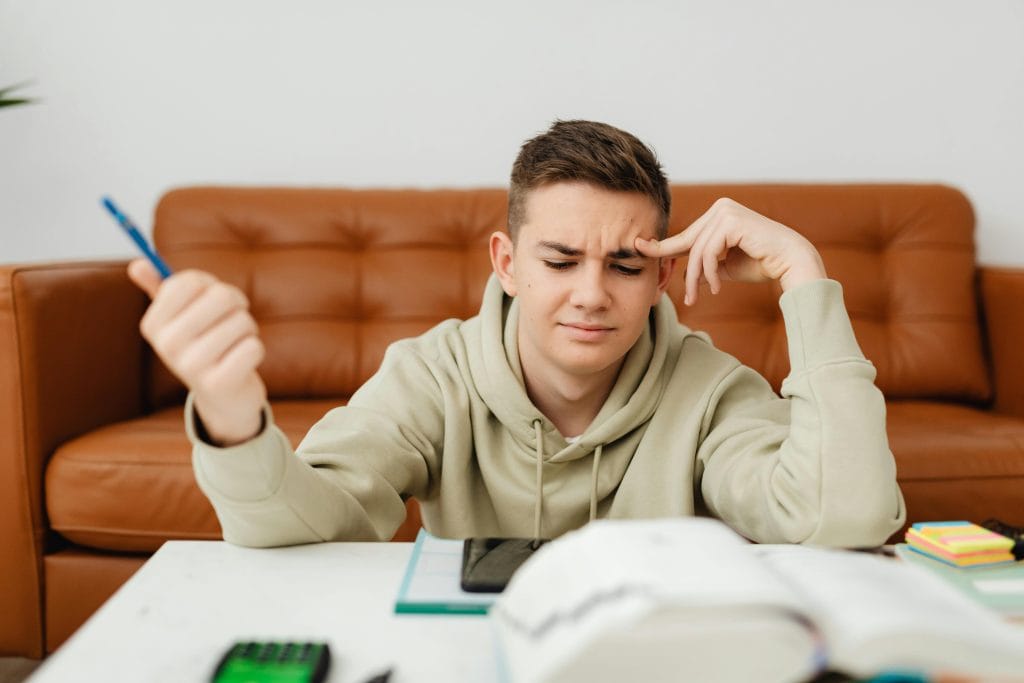
Recognizing signs of anxiety in teenage males requires attention to subtle behavioral shifts and physical complaints that often get dismissed as typical adolescent behavior. Teen boys express anxiety differently than girls, making early identification challenging for parents and caregivers.
Emotional and Behavioral Symptoms
Teen boys experiencing anxiety display distinct emotional and behavioral patterns that mask their internal distress. Constant irritability and angry outbursts serve as primary indicators, often replacing direct expressions of fear or worry. These boys frequently overreact to situations in extreme or irrational ways, responding with disproportionate anger to minor stressors.
Restlessness becomes a constant companion for anxious teen boys, manifesting as an inability to sit still or relax. Social withdrawal patterns emerge as they cut off relationships and increase isolation from friends and family members. This withdrawal differs from normal teenage independence-seeking behavior in its intensity and persistence.
Obsessive behaviors around social image consumption occupy significant mental energy. Teen boys fixate on appearance, social media presence, peer perception, and academic performance. Risk-taking behaviors increase as they seek to prove their strength or distract from anxious thoughts through dangerous activities like reckless driving, substance experimentation, or physical confrontations.
Compulsive or repetitive behaviors provide temporary anxiety relief but create additional stress cycles. Examples include excessive handwashing, nail-biting, skin picking, or checking behaviors. Sudden changes in communication patterns signal distress – previously talkative boys become withdrawn, while quiet teens might become unexpectedly aggressive or defensive.
Paranoid thoughts about peer judgment, academic failure, or social rejection dominate their thinking patterns. These boys interpret neutral situations as threatening and assume negative intentions from others without evidence.
Physical Symptoms
Physical symptoms of anxiety in teen boys often present as medical complaints that parents might attribute to growth spurts or general health issues. Headaches and stomachaches occur frequently, particularly before school, social events, or stressful situations. These aren’t imaginary complaints but real physical responses to psychological distress.
Sleep difficulties plague anxious teen boys through multiple pathways. They experience trouble falling asleep due to racing thoughts, frequent nighttime awakening, or early morning anxiety that prevents restful sleep. This sleep disruption creates a cycle where fatigue worsens anxiety symptoms during the day.
Cardiovascular symptoms include rapid heartbeat, chest tightness, and palpitations that can trigger panic responses. Sweating occurs even in cool temperatures, while trembling or shaking affects hands, voice, or the entire body during anxiety episodes.
Gastrointestinal distress extends beyond basic stomachaches to include nausea, diarrhea, loss of appetite, or frequent bathroom visits. These symptoms often coincide with school attendance or social situations.
Muscle tension concentrates in the shoulders, neck, jaw, and back regions, creating physical discomfort that compounds psychological stress. Dizziness or lightheadedness accompanies breathing changes during anxiety episodes, while fatigue persists even though adequate sleep is not due to the constant mental energy expenditure of managing anxious thoughts.
Restless behaviors like fidgeting, pacing, nail biting, or skin picking provide temporary relief but become habitual coping mechanisms that can cause secondary physical issues like infections or scarring.
Common Causes and Triggers
Understanding Anxiety in Teen Boys
Knowing what causes anxiety in teen boys can help you see patterns and tackle the real issues. Several connected factors play a role in how anxiety develops during these years.
School and Social Pressures
Schoolwork can be very stressful for teenage boys who are facing tough competition. They often feel the need to do really well on tests, keep good grades, and get into college. Many of them handle hard classes along with sports, clubs, and jobs, which can make their schedules really packed, leaving little time to rest or unwind.
Social media makes these pressures even worse by encouraging constant comparisons with others and exposing them to bullying online. Boys often struggle to keep up a perfect image online while worrying about being rejected or embarrassed in real life. This online world creates unrealistic ideas about success, looks, and popularity, leading to ongoing anxiety about measuring up to others.
Being aware of global issues like climate change and economic problems adds even more stress. Boys today learn about world events at levels never seen before, which can make them worried about their future. These outside pressures mix with everyday social stresses to create a complicated web of anxiety triggers.
Changes and Finding Identity
During puberty, hormonal changes greatly affect how teen boys manage their emotions and handle stress. Increases in testosterone can heighten their reactions to stress. These changes happen while their brains are developing quickly, especially in areas that help with decision-making and emotional control.
Boys also face unique challenges as they figure out who they are. They often question their beliefs and try to understand their identity. This can create a lot of inner conflict, leading to anxiety about meeting expectations of what it means to be a man while also trying to be true to themselves.
They become more aware of how others see them, which can lead to social anxiety. The fear of being embarrassed or rejected can feel overwhelming. The mix of hormonal changes, identity exploration, and social pressures creates a perfect storm for anxiety in teenage boys.
Brain differences in areas like the prefrontal cortex, amygdala, and hippocampus can affect anxiety disorders during this time. These brain parts help regulate fear, thought control, and how we respond to stress, making any issues with them especially impactful during adolescence when boys are already facing many changes.
Why Teen Boys Often Go Undiagnosed
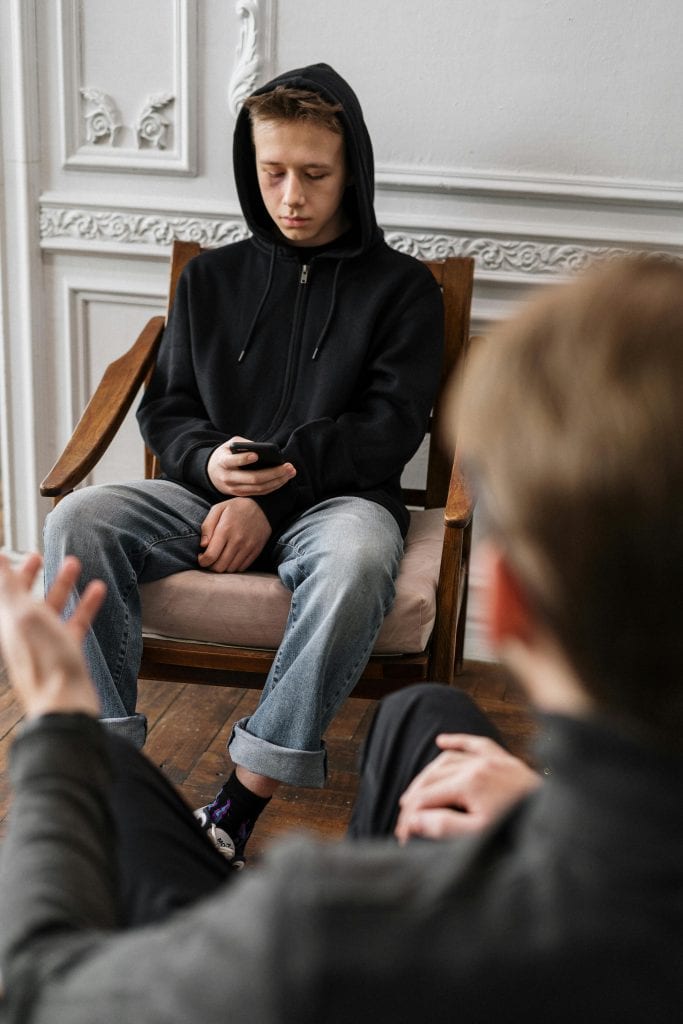
Anxiety in teen boys frequently goes unrecognized due to several interconnected factors that complicate accurate identification. Boys experience unique barriers to diagnosis that stem from both their symptom presentation and societal expectations around masculinity.
Symptom Masking and Overlap
Signs of anxiety in teenage males often appear disguised as other conditions or behaviors. Your son’s restlessness and difficulty concentrating might be attributed to ADHD rather than anxiety, even though a lot of teens with ADHD also struggle with anxiety disorders. This symptom overlap creates confusion for parents and healthcare providers who may focus on the more obvious condition while missing the underlying anxiety.
Physical symptoms like headaches and stomachaches are frequently dismissed as minor ailments or attention-seeking behavior. Boys experiencing anxiety may present these genuine physical manifestations without expressing the emotional distress behind them, leading to incomplete assessments.
Communication Barriers
Teenage boys view showing emotion as weakness, making them less likely to verbalize their fears or distress. Unlike girls who typically express anxiety more openly, boys mask their struggles through anger, isolation, or risk-taking behaviors. This communication gap means you might observe behavioral changes without understanding the anxiety driving them.
Your teen might become increasingly irritable or withdraw from relationships rather than discuss his worries. This indirect expression of anxiety makes it challenging for parents and professionals to connect the dots between observable behaviors and underlying mental health concerns.
Misinterpretation of Behaviors
Many anxiety symptoms in teenage boys get misinterpreted as typical adolescent behavior or other issues. Withdrawal from activities might be seen as normal teenage moodiness, while perfectionist tendencies could be viewed positively as high achievement rather than anxiety-driven compulsions.
Risk-taking behaviors and aggression are often attributed to hormonal changes or behavioral problems rather than recognized as anxiety responses. This misinterpretation delays appropriate intervention and support.
Diagnostic Challenges
The co-occurrence of anxiety with other mental health conditions creates diagnostic complexity. Depression symptoms can overshadow anxiety, leading healthcare providers to focus on the more apparent mood disorder. Also, the subtle presentation of anxiety in boys requires careful observation and specialized assessment tools that aren’t always utilized in routine evaluations.
Healthcare providers may lack specific training in recognizing how anxiety manifests differently in males compared to females, contributing to missed diagnoses. The traditional understanding of anxiety symptoms often centers on female presentations, leaving male-specific manifestations underrecognized.
The Impact of Untreated Anxiety on Teen Boys
Anxiety in teen boys creates far-reaching consequences that extend beyond temporary worry or stress. When left untreated, anxiety disorders significantly disrupt multiple areas of a teenager’s life and can establish patterns that persist into adulthood.
Effects on Academic Performance
Academic performance suffers dramatically when anxiety in teen boys remains unaddressed. Concentration becomes impaired as anxious thoughts consume mental resources that students need for learning and retention. Teen boys with untreated anxiety experience difficulty focusing during lectures, struggle to complete assignments, and find their minds going blank during exams even though adequate preparation.
Fear of failure drives many anxious teenage males toward perfectionism, creating a cycle where they procrastinate on assignments because they worry about not meeting impossibly high standards. This perfectionist mindset leads to avoidance behaviors where boys skip classes, refuse to participate in discussions, or avoid challenging coursework entirely.
Memory retention declines significantly in anxious students, making it harder to recall information during tests and presentations. The physical symptoms of anxiety – including rapid heartbeat, sweating, and nausea – further interfere with cognitive performance during critical academic moments.
Self-doubt undermines confidence in academic abilities, causing teen boys to second-guess correct answers or avoid raising their hands in class. This hesitation prevents them from demonstrating their actual knowledge and skills, resulting in grades that don’t reflect their true capabilities.
Social and Relationship Consequences
Social anxiety creates profound isolation for teenage boys who begin avoiding situations where they might face judgment or embarrassment. Signs of anxiety in teenage males often include withdrawing from peer groups, declining social invitations, and avoiding extracurricular activities that once brought enjoyment.
Friendships deteriorate when anxious teen boys consistently cancel plans, avoid group activities, or become increasingly irritable in social settings. The fear of saying something embarrassing or being rejected causes many boys to remain silent in conversations, leading peers to perceive them as disinterested or unfriendly.
Public speaking becomes particularly challenging, with many anxious teenage males avoiding presentations, refusing to participate in class discussions, or experiencing panic attacks when called upon to speak. This avoidance limits their ability to develop crucial communication skills and academic confidence.
Family relationships also suffer as anxious teen boys may become argumentative, withdrawn, or overly dependent on parents for reassurance. The constant need for validation can strain family dynamics and create additional stress within the household.
Romantic relationships become difficult to initiate or maintain when anxiety creates overwhelming fear of rejection or embarrassment. Teen boys may avoid dating entirely or become excessively worried about their appearance and social performance during interactions.
| Impact Area | Specific Consequences |
|---|---|
| Academic Performance | Impaired concentration, procrastination, memory difficulties, test anxiety |
| Social Relationships | Isolation, friendship deterioration, communication avoidance, family strain |
| Mental Health Risks | Depression, low self-esteem, suicidal ideation, substance use |
| Long-term Effects | Chronic anxiety patterns, academic underachievement, social skill deficits |
The withdrawal from social activities reinforces negative thought patterns and increases feelings of inadequacy. Teen boys begin to believe they’re different from their peers, further fueling the anxiety cycle and creating long-term challenges with social confidence and relationship formation.
Supporting Teen Boys with Anxiety

Effective support for anxiety in teen boys involves creating structured environments and implementing evidence-based interventions that address their unique needs. Parents and caregivers play a crucial role in building resilience through consistent communication and professional guidance when necessary.
Creating a Safe Environment at Home
Establishing a secure home environment forms the foundation for managing anxiety in teen boys. Quality time together through shared activities like cooking, walking, or watching movies strengthens family bonds and provides natural opportunities for conversation. These interactions create space for boys to express their concerns without feeling pressured to conform to traditional masculine expectations.
Maintaining consistent family routines reduces unpredictability and helps anxious teens feel more secure in their daily lives. Regular meal times, assignments schedules, and bedtime routines provide structure that can significantly alleviate anxiety symptoms. When routines become predictable, boys experience less stress about what comes next.
Encouraging relaxing activities such as reading, listening to music, or engaging in creative pursuits gives anxious teens healthy outlets for their emotions. These activities serve as natural stress reducers and help boys develop coping mechanisms they can use independently. Creating designated quiet spaces in the home where teens can retreat when feeling overwhelmed provides them with a sense of control over their environment.
Building trust through active listening and validating emotions helps reduce the stigma around mental health discussions. When parents demonstrate acceptance of their teen’s feelings rather than immediately trying to fix problems, boys become more likely to share their struggles. This open communication creates opportunities to educate teens about anxiety and empowers them to seek help when needed.
| Home Environment Strategy | Implementation | Anxiety Reduction Benefit |
|---|---|---|
| Quality family time | 30 minutes daily shared activities | Strengthens communication channels |
| Consistent routines | Regular meal and bedtime schedules | Reduces unpredictability stress |
| Relaxation spaces | Designated quiet areas | Provides emotional retreat options |
| Active listening | Validate emotions without judgment | Builds trust and openness |
Professional Treatment Options
Mental health professionals specializing in adolescent care provide tailored interventions specifically designed for teen boys experiencing anxiety. Cognitive-behavioral therapy (CBT) represents the most commonly recommended treatment approach, helping boys reframe negative thought patterns and develop healthier coping mechanisms. This evidence-based therapy gives teens practical tools to challenge anxious thoughts and choose their responses more effectively.
Seeking professional help becomes essential when anxiety persistently interferes with daily life activities such as schooling, friendships, or family relationships. Licensed counselors and treatment teams can identify root causes of anxiety and develop comprehensive treatment plans that address underlying issues. Early intervention significantly improves mental health outcomes and reduces the likelihood of long-term effects.
Treatment options may include mindfulness training, which teaches boys to stay present and manage overwhelming emotions. These techniques help teens develop emotional regulation skills and reduce the physical symptoms of anxiety. In some cases, medication prescribed by specialists may complement therapy to provide additional symptom relief while boys learn coping strategies.
The rise in anxiety diagnoses among adolescents—with rates increasing by 61% between 2016 and 2023—signals a growing need for accessible mental health services. Roughly 1 in 5 adolescents report symptoms of anxiety or depression, making professional support increasingly important for addressing this widespread issue. Mental health professionals use trauma-informed care approaches to help teens build resilience while working through contributing factors to their anxiety.
Comprehensive treatment approaches combine multiple therapeutic modalities to address the complex nature of anxiety in teen boys. These may include family therapy to improve communication patterns, group therapy to reduce isolation, and individual counseling to develop personalized coping strategies. The goal remains empowering teen boys to manage their anxiety effectively while maintaining their emotional and social development.
Building Healthy Coping Strategies
Building healthy coping strategies becomes essential when anxiety in teen boys disrupts their daily functioning and emotional development. Research shows that diagnosed anxiety in adolescents has risen approximately 61% from 2016 to 2023, affecting about 16.1% of teens aged 12 to 17. You can carry out evidence-based approaches that address the unique ways anxiety manifests in teenage males.
Cognitive-Behavioral Therapy (CBT)
Cognitive-Behavioral Therapy stands as the most recognized and effective treatment for anxiety in teen boys. CBT helps your teenager identify negative thought patterns and challenge distorted thinking that fuels anxiety. Your son learns to reframe catastrophic thoughts into more realistic perspectives through structured exercises.
The therapy includes exposure exercises where boys gradually face their fears in controlled environments. These sessions build confidence and reduce avoidance behaviors that strengthen anxiety over time. CBT also teaches practical skills like problem-solving techniques and communication strategies that directly reduce anxiety symptoms.
Physical Activity and Sports Participation
Physical activity provides one of the most accessible coping strategies for anxious teen boys. Regular exercise reduces physical tension and releases endorphins that naturally combat anxiety symptoms. Sports participation offers additional benefits through structured routines and social support systems.
Team sports create opportunities for boys to build connections with peers while focusing on shared goals. Individual activities like running or weightlifting give boys control over their environment and progress. Physical activity also improves sleep quality and provides a healthy outlet for nervous energy.
Mindfulness and Relaxation Techniques
Mindfulness practices help teen boys develop awareness of their thoughts and emotions without judgment. Deep breathing exercises provide immediate relief during anxiety episodes and can be used anywhere. You can teach your son the 4-7-8 breathing technique: inhale for 4 counts, hold for 7 counts, exhale for 8 counts.
| Technique | Duration | Benefits |
|---|---|---|
| Meditation | 10-20 minutes daily | Reduces racing thoughts |
| Yoga | 20-30 minutes | Combines movement with mindfulness |
| Progressive muscle relaxation | 15 minutes | Releases physical tension |
| Journaling | 10-15 minutes | Processes emotions and thoughts |
Regular meditation practice helps boys recognize anxiety triggers before they escalate. Yoga combines physical movement with breathing techniques, addressing both mental and physical aspects of anxiety. Journaling allows boys to express emotions they might struggle to verbalize.
Nature Exposure Benefits
Spending time outdoors provides significant protective benefits for mental health in teenage boys. Walking in areas with greenery, hiking, fishing, or gardening creates measurable improvements in mood and stress levels.
Nature activities remove boys from anxiety-provoking environments like social media and academic pressures. Outdoor exposure to natural light helps regulate circadian rhythms, improving sleep patterns that anxiety often disrupts. Gardening and similar activities provide a sense of accomplishment and control that counters feelings of helplessness.
When to Seek Professional Help
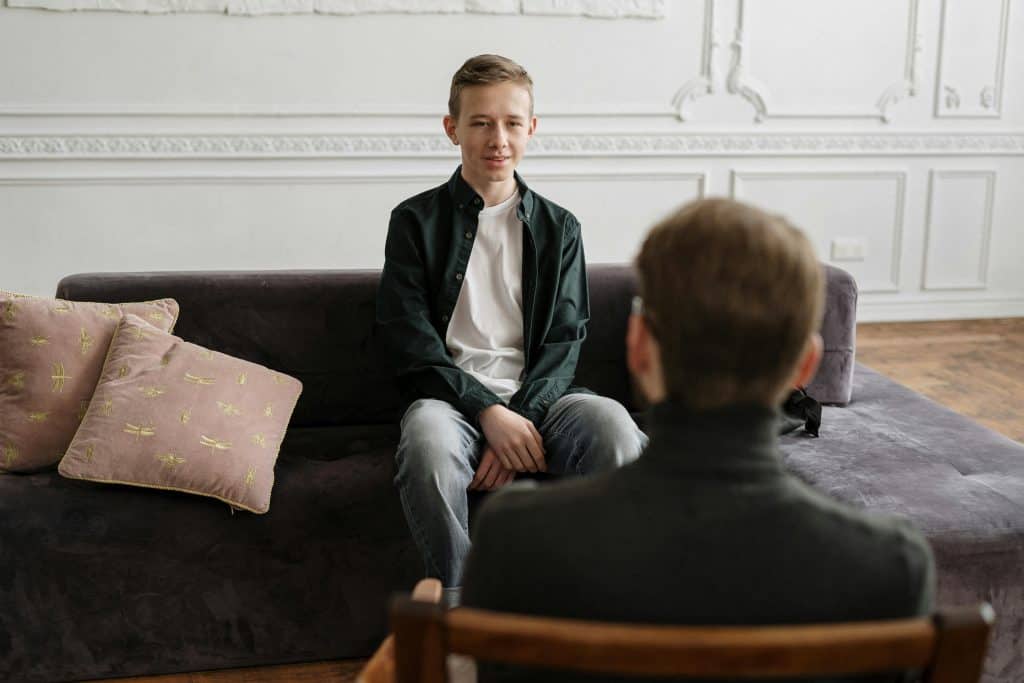
Recognizing when a teenage boy’s anxiety needs professional help involves more than just noticing symptoms. It’s important to take action when his anxiety starts to affect different parts of his life instead of just happening occasionally.
Drop in grades is a main sign he may need help. If your son’s grades keep going down in several subjects, if he starts missing school often, or if he procrastinates a lot on homework, these are red flags. Sometimes, anxiety makes boys overly worried about getting things perfect, which can lead to incomplete assignments because they fear making mistakes.
Isolation from friends is another sign that he needs support. If your son suddenly pulls away from friends, stops doing activities he used to enjoy, or becomes very fearful of what others think, it’s time to seek help. Boys with severe anxiety might not talk about their feelings and instead distance themselves from peers.
Ongoing physical symptoms should also be taken seriously. If your teen has regular headaches, stomachaches, or trouble sleeping, and doctors can’t find a physical cause, it may be related to anxiety. These physical issues can be serious and often require mental health support.
| Warning Signs Requiring Immediate Professional Help | Frequency/Duration | Impact Level |
|---|---|---|
| Academic grades dropping 2+ letter grades | 2+ consecutive months | Severe disruption |
| Complete social withdrawal from friends | 3+ weeks continuously | High isolation risk |
| Daily physical complaints without medical cause | 4+ weeks persistent | Significant distress |
| Sleep disruption affecting daily function | 2+ weeks ongoing | Functional impairment |
| Panic attacks or intense fear episodes | Multiple times per week | Crisis intervention needed |
Supporting Your Teen Through Anxiety
Anxiety can be especially challenging for teen boys, who may struggle to express what they’re going through or feel pressure to “tough it out.” But with the right guidance and care, they can learn healthy ways to cope, regain confidence, and thrive during these important years.
At Key Healthcare, we provide specialized treatment tailored to the unique needs of adolescents. If your son is showing signs of anxiety, our team is here to help with compassionate support and evidence-based care. Reach out to Key Healthcare today to learn how we can walk alongside your family on the path to healing.
Frequently Asked Questions
What are the signs of anxiety in teenage boys?
Teenage boys often show anxiety through behavioral changes rather than verbal expression. Common signs include increased irritability, anger outbursts, social withdrawal, risk-taking behaviors, and physical complaints like headaches or stomachaches. They may also experience sleep difficulties, declining academic performance, perfectionist tendencies, and excessive concern about their social image or appearance.
How does anxiety manifest differently in boys compared to girls?
Unlike girls who may openly express their worries, boys typically exhibit anxiety through indirect behaviors. They’re more likely to show irritability, aggression, or emotional shutdown rather than discussing their fears. Boys may engage in risky behaviors, become overly focused on social status, or display angry outbursts as ways of coping with their internal anxiety.
What causes anxiety in teenage boys?
Multiple factors contribute to anxiety in teen boys, including academic pressures, social media comparisons, global uncertainties, and hormonal changes during adolescence. Identity development challenges, societal expectations of masculinity, brain development changes, and co-occurring conditions like ADHD can also trigger or worsen anxiety symptoms in adolescent males.

